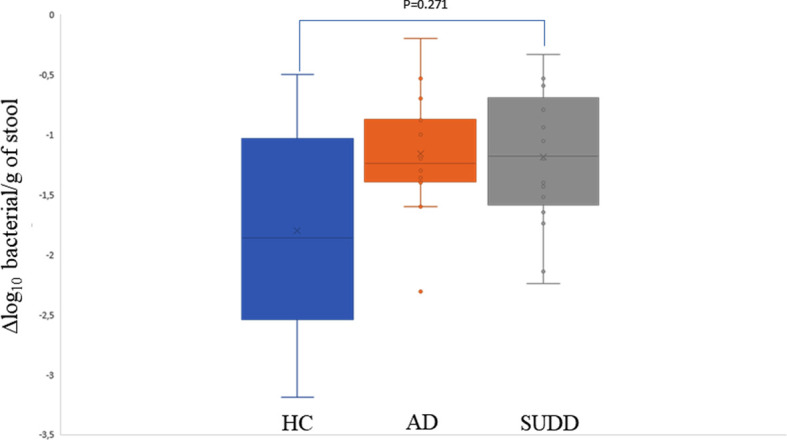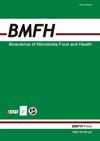在症状性无并发症的结肠憩室疾病中,prausnitzfaecalibacterium并未减少。
IF 2.9
4区 医学
Q2 Agricultural and Biological Sciences
引用次数: 3
摘要
在这封信中,对有症状的无并发症憩室病(SUDD)患者粪便中prausnitzfaecalibacterium的数量进行了评估。在连续44例患者中,包括15例SUDD患者、13例无症状憩室病(AD)患者和16例健康对照(HC)患者,HC、AD和SUDD患者的粪便中prausnitzfaecalibacterium的数量无显著差异(p=0.871)。与AD组(-4.11±1.03)和SUDD组(-4.03±1.299)相比,HC组(-4.57±2.15)较少。这种行为似乎不同于炎症性肠病(IBD)中发生的行为,类似于SUDD环境中其他黏液降解物种的行为。本文章由计算机程序翻译,如有差异,请以英文原文为准。

Faecalibacterium prausnitzii is not decreased in symptomatic uncomplicated diverticular disease of the colon.
In this letter, assessment of the amount of fecal Faecalibacterium prausnitzii in symptomatic uncomplicated diverticular disease (SUDD) is described. Among 44 consecutive patients, comprising 15 SUDD patients, 13 patients with asymptomatic diverticulosis (AD), and 16 healthy controls (HC), the fecal amount of Faecalibacterium prausnitzii was not found to be significantly different between HC, AD and SUDD subjects (p=0.871). Moreover, its count in the HC microbiota (−4.57 ± 2.15) was lower compared with those in the AD (−4.11 ± 1.03) and SUDD subjects (−4.03 ± 1.299). This behavior seems to be different from that occurring in inflammatory bowel disease (IBD) and similar to that of other mucin-degrading species in a SUDD setting.
求助全文
通过发布文献求助,成功后即可免费获取论文全文。
去求助
来源期刊

Bioscience of Microbiota, Food and Health
Immunology and Microbiology-Applied Microbiology and Biotechnology
CiteScore
5.50
自引率
3.20%
发文量
24
期刊介绍:
Bioscience of Microbiota, Food and Health (BMFH) is a peer-reviewed scientific journal with a specific area of focus: intestinal microbiota of human and animals, lactic acid bacteria (LAB) and food immunology and food function. BMFH contains Full papers, Notes, Reviews and Letters to the editor in all areas dealing with intestinal microbiota, LAB and food immunology and food function. BMFH takes a multidisciplinary approach and focuses on a broad spectrum of issues.
 求助内容:
求助内容: 应助结果提醒方式:
应助结果提醒方式:


